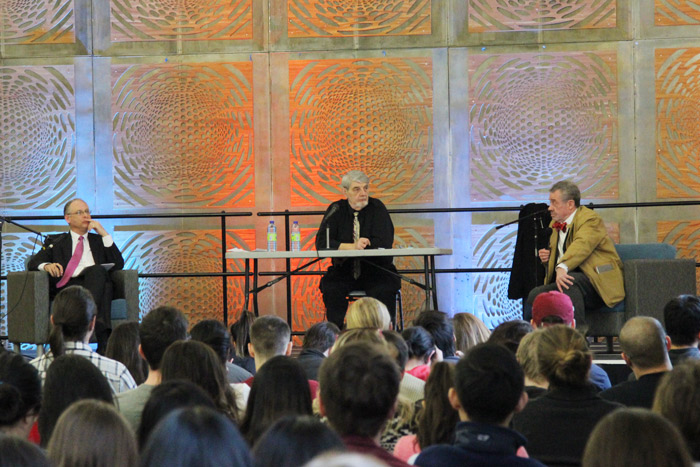On March 13, the McGill Students Trading Society (MSTS) hosted its first annual “Clash of the Professors’ event on the subject of global economic affairs. Economics Professor Paul Dickinson moderated the debate between Economics and North American Studies Associate Professor Tom Velk and Economics Associate Professor Christopher Ragan.
MSTS Chief Marketing Officer Omar El-Sharawy introduced Ragan and Velk, noting that they both have had influence on financial institutions in their past positions, as Ragan served as an advisor to the Bank of Canada and Velk sat on the Board of Governors of the American Federal Reserve System.
Debate questions were divided into four topics: Environmental policy, international trade, central bank policy, and government spending in Canada. For every question, Ragan and Velk had two minutes to present a position and one minute for a rebuttal.
Dickinson first posed a question about whether carbon pricing would affect greenhouse gases.
“The logic of carbon pricing is based on the idea that markets work pretty well, that prices actually allocate resources,” Ragan said. “It goes way back to Adam Smith, when scarcity is reflected by higher-level prices and abundance is reflected by lower-level prices. By changing [carbon pricing], you are going to change behaviour.”
Velk disagreed with the notion of carbon pricing, dismissing climate change entirely.
“The notion of climate change and global warming is like religion for me, it doesn’t have support,” Velk said.
On free trade and trade agreements, Velk and Ragan agreed that the real-life implications of industry specialization are often overlooked.
“England makes great cloth, lousy wine,” Velk said. “Portugal makes great wine, lousy cloth. As trade gets going, England clothmakers and Portuguese winemakers are better off. The problem is, Portuguese clothmakers are out of business, as are English winemakers.”
However, Ragan pointed out that the country specializing in the more valuable resource has increased bargaining power in negotiations, resulting in national benefits.
“We actually have some bargaining power […] with the United States because we do some things very well,” Ragan said. “We export all of our natural gas to the United States.”
Another topic that Velk and Ragan differed on was their view of central banks.
“Central banking has the danger of allowing governments to borrow money irresponsibility,” Velk said.
Ragan, while agreeing with Velk that central banks have not always been productive to society, argued they are more successful than changes in policy.
“I don’t believe that central banks are perfect by any means, but I think the period from 1991 to 2008 shows central banks operating very successfully,” Ragan said.
When asked about government spending, Velk used the Affordable Care Act (ACA) as reasoning to have reservations against government expenditure.
“Everyone should pay for what they get,” Velk said. “The money [for ACA] comes from taxpayers and a lot of us end up having a life better than what we deserve to have and what we paid for.”
By contrast, Ragan supports government spending if it benefits a community.
“Yes, as long as the infrastructure is actually going to benefit the future generation,” Ragan said. “So, if you’re going to build stupid stuff that doesn’t benefit you or your children, I don’t think we should go with it at all or make you pay for it. If we are going to use money to build libraries or universities, […] I have no problem about using money to create a good infrastructure.”








Doug says, “your too intelligent to believe any thing he is espousing.” I wonder? Pat